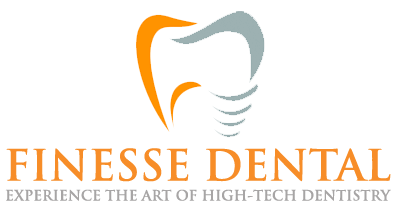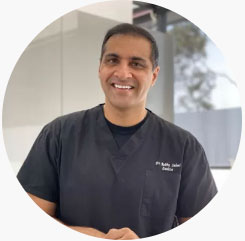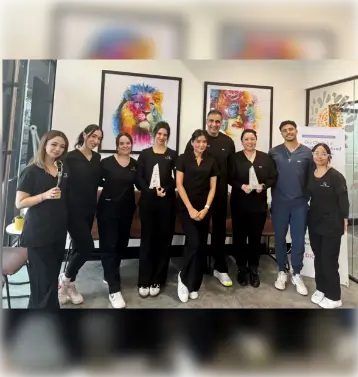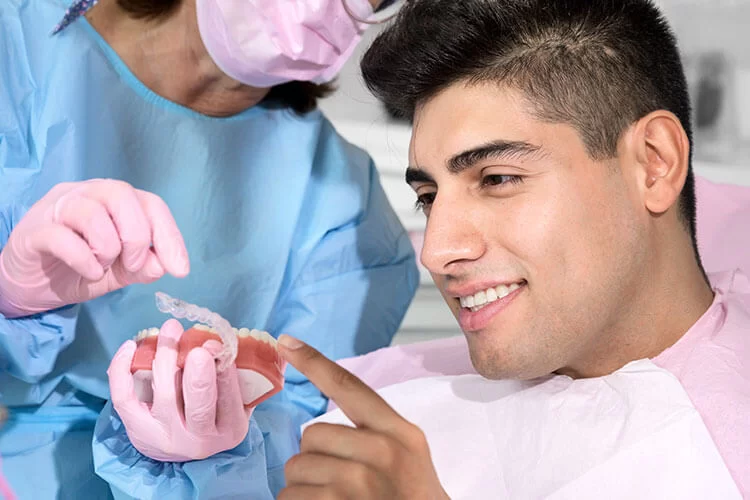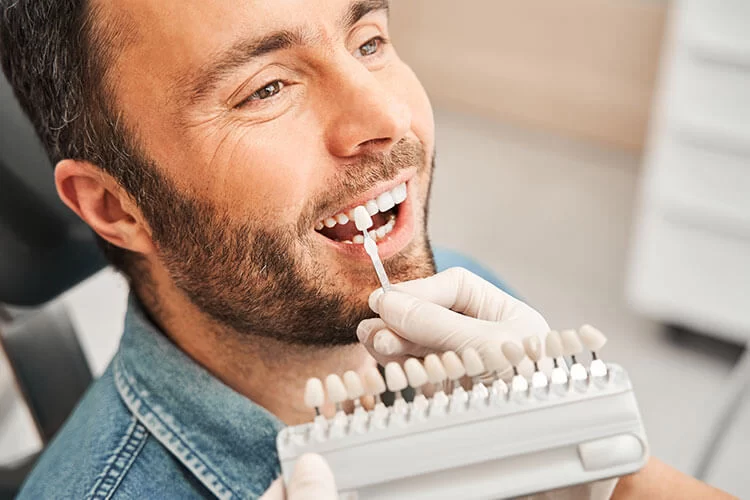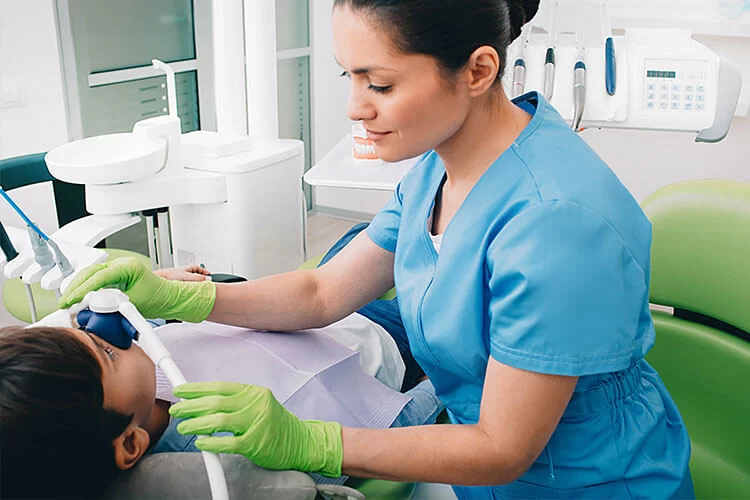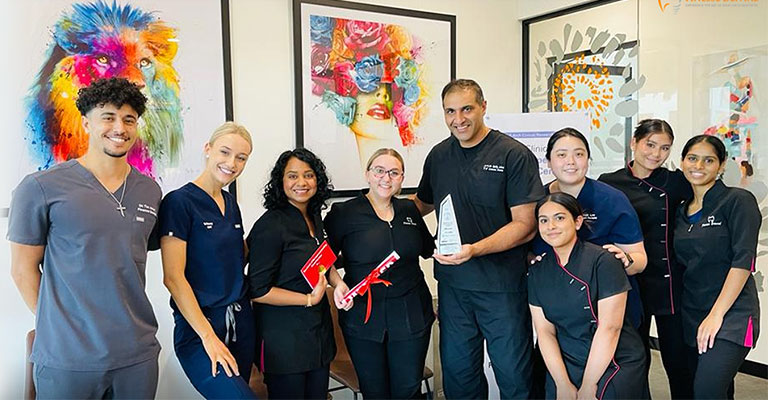
Dentist Rouse Hill
Your trusted family and cosmetic dentists near Rouse Hill providing reliable services for 13+ years.

WELCOME TO FINESSE DENTAL
A Dental Clinic near Rouse Hill for your beautiful smile
At Finesse Dental, we are always striving to learn more and enhance our skills so that we can provide quality dental care to all of our Rouse Hill patients, both new and existing. We firmly believe in preventive methods such as educating our patients on how they can maintain good oral health at home. By doing this, we hope to avoid gum disease and tooth decay altogether.
At our general and cosmetic dental practice, we understand that your smile is important to you. This is why our dental team makes it a priority to focus on your teeth’s health from the moment you walk in for your first appointment.
Finesse Dental clinic has also been recognised by many prestigious awards for our excellence in patient and customer service. We are elated to have received the following awards:
- 2021 Local Business Awards
- 2019 Local Business Awards
- 2019 What Clinic Patient Service Award
- 2019 Australian Small Business Champion Award (National)
Special Offers

New Patient Check-up & Clean (GAP-FREE)
👉 GAP-FREE for Health Fund members (with valid HF card brought in appointment)
👉 $220 for non Health Fund members
- Comprehensive 60-minute dental check-up
- Thorough clean
- At least 2 digital X-rays (reduces 90% of exposure)
T&Cs apply. Enquire at the clinic.
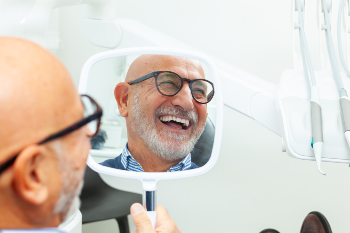
Complimentary Consultation - Dental Implants & Orthodontics
- Free Consultation for Dental Implants and Full Arch Implants (save $500)
- Free Consultation for Invisalign (save $250)

Advanced Dentistry
Our skilled team offers an array of dental services, from complete smile transformations to more complex procedures. We’re also proud to provide implants and orthodontic work for patients who need it.

Interest-Free Payment Plans
We do everything to make sure that major treatments are affordable for all of our patients living in Rouse Hill.

Comfortable Dental Practice
Come to our office for a judgement-free environment where we’ll give you the treatment you need.

Friendly Dental Staff
Not only do our dentists make you feel welcome, but they also go the extra mile to ensure that you’re comfortable and part of our dental community!
Meet Our Friendly Team Ready to Help You
Award Winning Dentists
General Dental Care
General dentistry is composed of several different aspects that all work together to maintain dental health and keep your smile looking great.
Dental Implants
Dental implants not only improve your eating habits, but they also give you a beautiful smile.
Aesthetic Dentistry
A smile is not only beautiful, but it also improves your mood and how you feel about yourself.

Adult Orthodontics
If you want perfect teeth, adult orthodontics is the way to go.
TREAT YOURSELF TO
Comprehensive Dental Services
At our dental clinic, we believe that visiting the dentist shouldn’t be a chore. That’s why we’ve designed a spa-like and comfortable environment for all of our dental treatments and services.
Laser Teeth Bleaching
With laser teeth whitening, you can achieve whiter and brighter teeth in only a single session.
Tooth Implants
Dental implants are a terrific solution, whether you need to replace just one tooth or your entire set of teeth.
Free Smile Consultation
Because your smile is important to us, the first appointment at Finesse Dental for a makeover is free.
Invisalign Sydney
Invisalign can be an alternative to traditional metal braces for adults and teens who are looking for a more aesthetic option.
Dental Veneers - Porcelain and Composite
Composite and porcelain dental veneers can help improve the look of your teeth and also protect them from further damage.
Composite and Porcelain Veneers
Veneers provide an excellent cosmetic option for those who want a stunning smile without extensive work on their teeth.
Expert Sedation Dentistry
Intravenous sedation provides a more intense level of control over a patient’s anxiety.
CONTACT US
LET US HELP YOU IMPROVE YOUR SMILE
Fill out the form below and we will contact you during our working hours.
Quality Dental Care
How does the process of receiving dental implants work?
Initial Assessment and Treatment Planning
The journey towards receiving dental implants begins with an initial assessment at a dental clinic. This step is crucial as it allows the dentist to evaluate the patient’s oral health and determine the suitability for dental implants. The assessment typically involves detailed discussions about the patient’s medical history, dental health, and specific dental care needs. Utilising advanced imaging techniques, the dentist gains a comprehensive view of the jawbone, vital for planning the implant procedure.
Jawbone Preparation
In cases where the jawbone lacks the necessary density to support an implant, preparatory procedures such as bone grafting may be required. This phase is essential for building a solid foundation for dental implants. Bone grafting involves transplanting bone material to enhance the density and volume of the jawbone, setting the stage for successful implant integration.
Implant Placement Procedure
The core of the dental implant process is the surgical placement of the implant into the jawbone, performed under sterile conditions in the dental clinic. The dentist makes a precise incision in the gum tissue to expose the underlying bone. A specialised drill creates a space to accommodate the implant—a titanium post that serves as a synthetic tooth root. After placing the implant, the incision is sutured, and the area is allowed to heal. This phase focuses on osseointegration, where the bone naturally integrates with the titanium post, a critical factor for the stability of the implant.
Healing and Integration
The healing period following the placement of tooth implants is pivotal for the success of the procedure. During this time, patients must follow specific dental care guidelines to ensure optimal healing and integration of the implant with the jawbone. This period can vary but generally spans several months, during which the patient might wear a temporary crown to aid in function and appearance.
Abutment Attachment and Permanent Prosthesis
Once the tooth implant has successfully bonded with the jawbone, the next step is the attachment of the abutment—a piece that connects the dental implant to the final prosthesis. This minor surgical step may require reopening the gum to expose the tooth implant and attach the abutment. After the gums heal around this structure, dental impressions are taken, and a customised crown, bridge, or denture is created to match the natural appearance of the patient’s teeth.
Long-Term Care and Maintenance
After the placement of the final prosthesis, the focus shifts to long-term care and maintenance of the dental implant. Regular dental services are crucial to monitor the implant and manage overall dental and oral health. The patient is advised on proper dental hygiene practices, including regular brushing, flossing, and routine dental check-ups. These measures are vital to prevent complications such as gum disease, which can affect the longevity of dental implants.
What are the dietary recommendations after dental implant surgery?
After undergoing surgery for dental implants, it is crucial to adhere to specific dietary guidelines to ensure a smooth recovery and avoid complications. The right nutrition can significantly aid the healing process, helping to minimise swelling, discomfort, and the risk of infection.
Immediate Post-Surgery Recommendations
In the first 24 to 48 hours following surgery, it’s vital to focus on consuming soft foods and liquids to avoid putting pressure on the surgical sites. During this period, patients are typically advised to avoid chewing directly on the implant area to prevent dislodging the new implant or causing undue stress to the site.
Suitable Foods:
- Smoothies: Packed with essential nutrients, smoothies can be an excellent way to consume fruits and vegetables without the need for chewing.
- Broths and soups: Warm (not hot) broths and creamy soups provide nourishment without requiring chewing, which can help keep the surgical site intact.
- Yoghurt and applesauce: These provide a soothing texture and are gentle on the mouth, making them perfect for post-surgery diets.
Foods to Avoid:
- Crunchy and hard foods: Foods like chips, nuts, and seeds can irritate the surgical site or become lodged in the area, causing discomfort or infection.
- Spicy and acidic foods: These can irritate the gum tissue and should be avoided to prevent inflammation.
Transitioning to More Solid Foods
After the initial few days, if the healing process is going well, patients can gradually introduce more solid foods into their diet. However, it’s important to continue prioritising soft foods that require minimal chewing effort.
Foods to Include:
- Pasta and rice: Softly cooked pasta and rice are gentle on the teeth and less likely to create disturbance around the implant area.
- Scrambled eggs: High in protein and soft in texture, scrambled eggs are an ideal choice for increasing nutrient intake without compromising the healing process.
- Mashed potatoes: Offering both nutrition and comfort, mashed potatoes can be enriched with butter or cream for additional calories and flavour if needed.
Long-Term Dietary Adjustments
As patients progress with their recovery, they can return to a more regular diet, but with an ongoing emphasis on protecting their new dental implants.
Permanent Dietary Considerations:
- Avoid sticky and extremely hard foods: Foods like caramel or hard candy can exert too much force on the implant, potentially leading to damage.
- Maintain balanced nutrition: A balanced diet rich in vitamins A and C, protein, and calcium supports overall dental health and longevity of the dental work.
Following these dietary recommendations after dental implant surgery is key to a successful recovery. By carefully selecting foods that promote healing and avoiding those that might jeopardise the integrity of the new implant, patients can ensure a smoother recovery and long-term success of their surgical procedure. Overall, these dietary guidelines play a crucial role in the postoperative care and maintenance of dental health.
Is undergoing cosmetic dentistry a valuable choice?
Undergoing cosmetic dentistry can be a valuable choice for many individuals. Cosmetic dental treatments like dental crowns and teeth whitening not only enhance the aesthetic appearance of teeth but also contribute to overall oral health. Dental crowns provide structural support and protect damaged teeth, while teeth whitening can boost confidence and encourage better dental hygiene habits. Additionally, cosmetic dental services often include options like porcelain veneers, which offer a transformative solution for numerous dental imperfections. By opting for a dental service that provides high-quality dental care, patients can ensure a gentle dental experience. This comprehensive approach not only improves appearance but also significantly enhances oral functionality and health.
When is the right time to schedule your child’s first dental visit?
Schedule your child’s first dental check-up approximately at their first birthday or within six months of their first tooth appearing, whichever occurs earlier. This early introduction is crucial in children’s dentistry, setting the stage for lifelong dental health and comfort in dental settings.
What are the signs indicating a severe toothache?
A severe toothache can disrupt daily activities and is usually a sign that urgent dental care is required. Recognising the symptoms of a severe toothache is crucial for seeking timely treatment and potentially averting more serious dental emergencies.
Persistent Pain
One of the primary indicators of a severe toothache is persistent pain that doesn’t subside with over-the-counter pain relievers. This type of pain may be constant or may throb without relief, indicating that the issue is not merely superficial.
Swelling in the Gum Area
Noticeable swelling around the affected tooth or in the gum area is a clear sign of infection. This swelling can sometimes extend to the face or neck, depending on the severity of the infection, and may be accompanied by a feeling of warmth and tenderness when touched.
Increased Sensitivity
A tooth that suddenly becomes extremely sensitive to hot or cold temperatures or to the pressure of chewing suggests a potentially serious underlying problem. This increased sensitivity can signify nerve damage or deep decay.
Presence of Pus
The appearance of pus or a pimple-like bump on the gums near the toothache area is indicative of an abscess, which is a severe infection that requires immediate dental attention.
Fever and Malaise
Experiencing a fever along with a toothache suggests that the infection may be spreading. General feelings of illness or malaise are also red flags that the body is fighting a significant infection.
Facing these severe toothache symptoms requires immediate attention from an experienced dentist. Rouse Hill residents can trust our dental practice to provide urgent care and expert treatment, ensuring their dental health is promptly restored.
Do you offer flexible payment plan options for dental treatments?
Yes, we provide flexible payment plan options to make quality dental care affordable for everyone. Our team can help you arrange a plan that suits your budget, so you can get the treatment you need without financial stress.
Do you provide CDBS, IV sedation, or happy gas for patients?
Absolutely. We accept the Child Dental Benefits Schedule (CDBS) for eligible families. For nervous or anxious patients, we also offer both IV sedation and happy gas options to ensure your dental visit is calm, relaxed, and comfortable.
Note: Any surgical or invasive procedure carries risks. Before proceeding, you should seek a second opinion from an appropriately qualified health practitioner.
